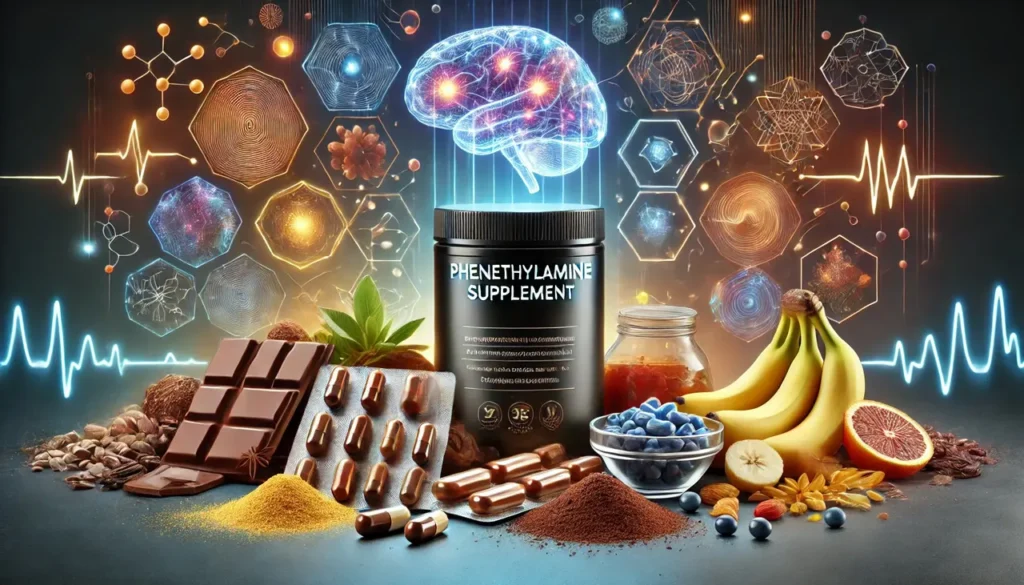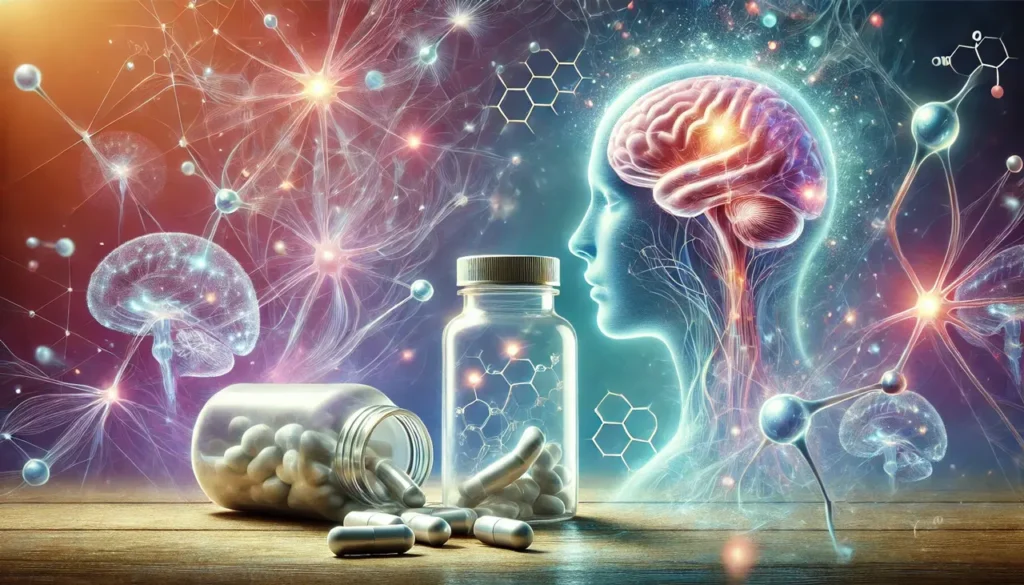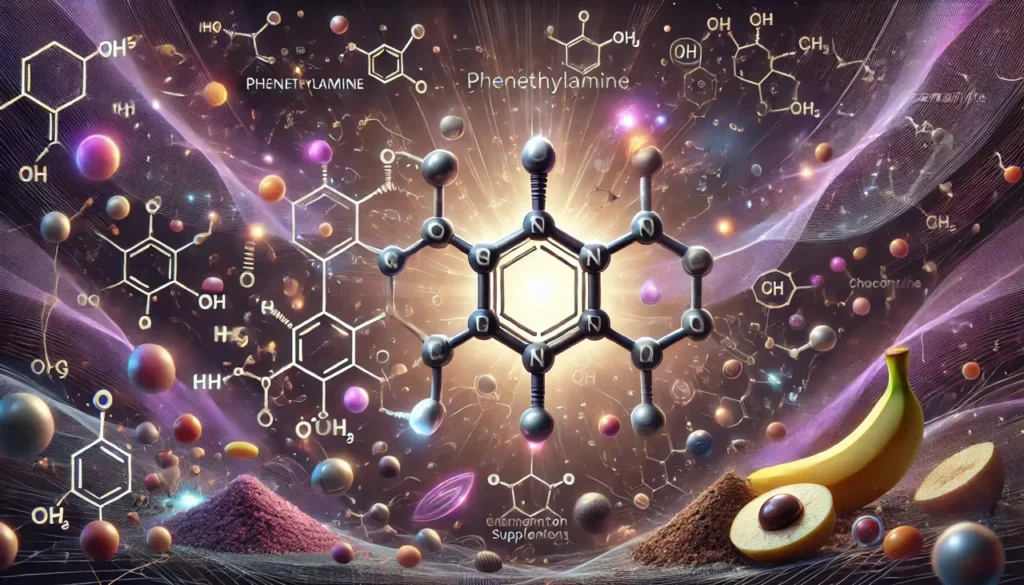Phenethylamine (PEA) is a naturally occurring monoamine alkaloid and trace amine that plays a crucial role in the brain’s chemistry. Known for its potential stimulant and mood-enhancing properties, PEA has recently gained attention as a possible nootropic supplement. It is synthesized in the body from the amino acid phenylalanine and is found in small amounts in foods such as chocolate, eggs, and some cheeses. This article provides an in-depth analysis of phenethylamine, covering its chemistry, physiological mechanisms, nootropic benefits, dosing guidelines, potential side effects, drug interactions, and important considerations for its safe use as a supplement.
You May Also Like:
Sources
Phenethylamine is naturally found in several dietary sources, including:
- Chocolate: One of the richest dietary sources of phenethylamine, contributing to its reputation for enhancing mood.
- Eggs: A source of phenylalanine, which is metabolized into phenethylamine.
- Cheese: Particularly aged cheeses, which contain higher levels of this compound.
- Meat and fish: Provide phenylalanine, the precursor to PEA.
Elevate Focus and Nerve Strength with Scientifically Backed Phenylalanine—Order Now on Amazon!

Chemistry of Phenethylamine
Chemically, phenethylamine is a derivative of the amino acid phenylalanine. It is composed of a phenyl ring attached to an ethylamine chain, giving it the ability to cross the blood-brain barrier. Once in the brain, phenethylamine stimulates the release of neurotransmitters like dopamine, norepinephrine, and serotonin. This results in enhanced mood, improved focus, and increased energy levels, which is why it is often classified as a stimulant or mood enhancer.
In the body, phenethylamine is rapidly broken down by the enzyme monoamine oxidase B (MAO-B). This short half-life means its effects are brief unless combined with MAO-B inhibitors, which slow down its degradation.

Physiological Mechanisms of Action in the Body and Brain
Phenethylamine’s primary mechanism of action involves modulating neurotransmitter activity in the brain. It primarily affects dopamine and norepinephrine, which are critical for regulating mood, motivation, and cognitive function. The following outlines its key mechanisms:
- Dopamine and Norepinephrine Release: PEA triggers the release of dopamine, a neurotransmitter associated with feelings of pleasure and reward. It also enhances the release of norepinephrine, which is involved in attention and arousal. This combination leads to increased energy, improved mood, and sharper focus.
- Serotonin Modulation: While phenethylamine’s impact on serotonin is less direct, it still influences serotonin levels. By enhancing mood and reducing feelings of fatigue, PEA can indirectly contribute to a sense of well-being.
- Short-lived Activity: PEA has a very short half-life because it is quickly metabolized by monoamine oxidase B (MAO-B). This rapid metabolism means that its effects can be fleeting unless steps are taken to inhibit MAO-B activity.
Due to its stimulant effects, phenethylamine is often referred to as the “love drug” because of its mood-enhancing properties. It is also naturally released in the brain during moments of intense excitement or physical activity.
Recharge Cognitive Health and Nerve Wellness with Phenylalanine Supplements—Shop Amazon’s Best Now!

Nootropic Benefits of Phenethylamine
The potential nootropic benefits of phenethylamine are primarily due to its ability to stimulate dopamine and norepinephrine release. While research on phenethylamine as a nootropic is still in its early stages, there is evidence to suggest that it may provide cognitive benefits under certain conditions:
- Mood Enhancement and Motivation: The release of dopamine and norepinephrine induced by phenethylamine can lead to improved mood, increased motivation, and a greater sense of well-being. This can be particularly helpful for individuals who suffer from mild mood disturbances or fatigue.
- Cognitive Focus and Mental Clarity: Due to its stimulant-like properties, phenethylamine may improve attention, concentration, and cognitive performance, especially during periods of mental fatigue. This makes it a potential aid for students or professionals looking to enhance productivity.
- Weight Loss Support: Phenethylamine has been explored as a supplement for weight loss due to its stimulant effects, which may increase metabolism and reduce appetite. While this is not directly a nootropic benefit, improved energy levels can indirectly enhance cognitive performance by reducing mental and physical sluggishness.
- Enhanced Athletic Performance: PEA’s stimulant properties may also improve athletic performance by increasing energy levels and focus, which could benefit athletes in training or competition.
- Potential for Mood Disorders: There is some evidence that phenethylamine could be beneficial for individuals with mood disorders such as depression, particularly those with conditions related to low dopamine levels. However, more research is needed to confirm this application.

Dosage and Supplementation Guidelines
The appropriate dosage of phenethylamine for nootropic use can vary based on individual needs, tolerance, and goals. Standard dosages for cognitive enhancement and mood support generally range between 100 mg and 500 mg per day. It is important to start with a lower dose to assess tolerance, especially since PEA’s effects can be potent and short-lived.
- Typical Nootropic Dose: For general cognitive enhancement or mood improvement, a dose between 200 mg and 500 mg taken once or twice daily is common. This should be taken on an empty stomach for better absorption.
- Stacking with MAO-B Inhibitors: Some users stack phenethylamine with an MAO-B inhibitor, such as selegiline or hordenine, to extend its effects. This combination slows the breakdown of phenethylamine, allowing its effects to last longer. However, this should be done cautiously, as combining MAO-B inhibitors with other substances can increase the risk of side effects.
- Cycling: Due to the body’s tendency to develop tolerance to phenethylamine, it is recommended to cycle its use. For example, taking PEA for five days followed by a two-day break can help reduce tolerance buildup.
Elevate Focus and Nerve Strength with Scientifically Backed Phenylalanine—Order Now on Amazon!

Side Effects and Safety
Phenethylamine is generally considered safe for short-term use when taken in appropriate dosages. However, it can cause side effects, particularly if taken in excessive amounts or combined with other substances.
Common side effects include:
- Increased Heart Rate and Blood Pressure: Due to its stimulant effects, PEA can cause a temporary increase in heart rate and blood pressure. Individuals with heart conditions or high blood pressure should avoid using this supplement.
- Anxiety and Nervousness: Some users report feelings of anxiety or restlessness when taking higher doses of phenethylamine. This is especially true for those who are sensitive to stimulants.
- Insomnia: As a stimulant, phenethylamine can interfere with sleep if taken too late in the day. It is best to take it in the morning or early afternoon to avoid sleep disturbances.
- Headaches: In rare cases, phenethylamine may trigger headaches, especially when combined with other stimulants or nootropics that impact neurotransmitter levels.
Interactions with Other Supplements and Medications
Phenethylamine can interact with several other substances, both supplements and medications. These interactions can amplify or diminish its effects and may increase the risk of side effects.
- MAO Inhibitors (MAOIs): As mentioned, phenethylamine is rapidly broken down by MAO-B. Taking PEA with MAO inhibitors (e.g., selegiline, rasagiline) can prolong its effects, but doing so also increases the risk of serious side effects like hypertensive crisis. This combination should only be done under medical supervision.
- Stimulants: Combining phenethylamine with other stimulants such as caffeine, amphetamines, or ephedrine can result in overstimulation, leading to increased heart rate, anxiety, and jitteriness. Caution is advised when stacking multiple stimulants.
- Antidepressants: Phenethylamine’s effects on dopamine and norepinephrine make it potentially unsafe for individuals taking certain antidepressants, particularly selective serotonin reuptake inhibitors (SSRIs) or serotonin-norepinephrine reuptake inhibitors (SNRIs). These combinations can increase the risk of serotonin syndrome, a dangerous condition characterized by excessive serotonin activity.
- Blood Pressure Medications: Since PEA can increase blood pressure, it may counteract the effects of antihypertensive medications, potentially leading to uncontrolled blood pressure levels.
Potential Dangers for Individuals with Certain Health Conditions
While phenethylamine is safe for most healthy individuals when taken at recommended doses, certain populations should exercise caution or avoid its use altogether.
- Heart Disease: Individuals with cardiovascular conditions, including high blood pressure or arrhythmias, should avoid phenethylamine due to its stimulant effects, which can exacerbate these conditions.
- Anxiety Disorders: PEA’s stimulant properties may worsen symptoms of anxiety or panic disorders. It can trigger jitteriness and nervousness, making it unsuitable for individuals prone to anxiety attacks.
- Bipolar Disorder: Due to its mood-enhancing properties, phenethylamine could potentially trigger manic episodes in individuals with bipolar disorder. Those with this condition should avoid PEA or consult a healthcare provider before using it.
- Pregnancy and Breastfeeding: There is limited research on the safety of phenethylamine during pregnancy and breastfeeding. Therefore, it is advisable to avoid its use during these periods unless under medical advice.
Boost Your Brain’s Performance and Nerve Wellness with Phenylalanine Supplements—Shop Now on Amazon!

Conclusion: Should You Consider Phenethylamine as a Nootropic?
Phenethylamine offers a range of potential nootropic benefits, including enhanced mood, increased focus, and improved energy levels. Its ability to stimulate dopamine and norepinephrine makes it a promising supplement for those seeking cognitive enhancement or mood support. However, due to its short half-life and potential for side effects, careful attention should be paid to dosing and stacking, particularly when using MAO-B inhibitors or other stimulants. Additionally, individuals with certain health conditions, such as heart disease, anxiety, or mood disorders, should avoid PEA or consult with a healthcare provider before using it.
Ultimately, while phenethylamine may hold promise as a nootropic, it is important to weigh the benefits against potential risks and side effects. As with any supplement, it is advisable to start with a low dose and gradually increase it as needed while monitoring for any adverse reactions.

References:
- Phenylethylamine: The Little-Known Supplement that Supports Brain Health. Retrieved from: https://draxe.com/nutrition/phenylethylamine/
- Phenethylamine. Retrieved from: https://www.sciencedirect.com/topics/neuroscience/phenethylamine
- Phenylethylamine modulation of affect: therapeutic and diagnostic implications. Retrieved from: https://pubmed.ncbi.nlm.nih.gov/7711493/
- How does Phenylethylamine work in the brain? Retrieved from: https://nootropicsexpert.com/phenylethylamine/
Important Note: The information contained in this article is for general informational purposes only, and should not be construed as health or medical advice, nor is it intended to diagnose, prevent, treat, or cure any disease or health condition. Before embarking on any diet, fitness regimen, or program of nutritional supplementation, it is advisable to consult your healthcare professional in order to determine its safety and probable efficacy in terms of your individual state of health.
Regarding Nutritional Supplements Or Other Non-Prescription Health Products: If any nutritional supplements or other non-prescription health products are mentioned in the foregoing article, any claims or statements made about them have not been evaluated by the U.S. Food and Drug Administration, and such nutritional supplements or other health products are not intended to diagnose, treat, cure, or prevent any disease.


